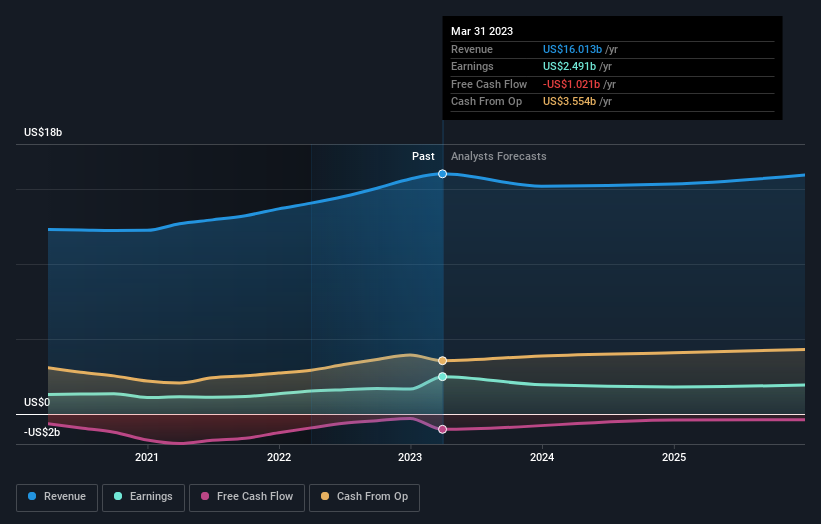After a year of 0.8% returns, Consolidated Edison, Inc.'s (NYSE:ED) share price drop last week may have less of an impact on institutional investors
Key Insights
Significantly high institutional ownership implies Consolidated Edison's stock price is sensitive to their trading actions
A total of 25 investors have a majority stake in the company with 50% ownership
Every investor in Consolidated Edison, Inc. (NYSE:ED) should be aware of the most powerful shareholder groups. And the group that holds the biggest piece of the pie are institutions with 68% ownership. In other words, the group stands to gain the most (or lose the most) from their investment into the company.
Losing money on investments is something no shareholder enjoys, least of all institutional investors who saw their holdings value drop by 3.3% last week. However, the 0.8% one-year returns may have helped alleviate their overall losses. We would assume however, that they would be on the lookout for weakness in the future.
Let's delve deeper into each type of owner of Consolidated Edison, beginning with the chart below.
See our latest analysis for Consolidated Edison
What Does The Institutional Ownership Tell Us About Consolidated Edison?
Institutions typically measure themselves against a benchmark when reporting to their own investors, so they often become more enthusiastic about a stock once it's included in a major index. We would expect most companies to have some institutions on the register, especially if they are growing.
Consolidated Edison already has institutions on the share registry. Indeed, they own a respectable stake in the company. This can indicate that the company has a certain degree of credibility in the investment community. However, it is best to be wary of relying on the supposed validation that comes with institutional investors. They too, get it wrong sometimes. If multiple institutions change their view on a stock at the same time, you could see the share price drop fast. It's therefore worth looking at Consolidated Edison's earnings history below. Of course, the future is what really matters.
Institutional investors own over 50% of the company, so together than can probably strongly influence board decisions. We note that hedge funds don't have a meaningful investment in Consolidated Edison. Our data shows that BlackRock, Inc. is the largest shareholder with 13% of shares outstanding. Meanwhile, the second and third largest shareholders, hold 13% and 7.5%, of the shares outstanding, respectively.
After doing some more digging, we found that the top 25 have the combined ownership of 50% in the company, suggesting that no single shareholder has significant control over the company.
While studying institutional ownership for a company can add value to your research, it is also a good practice to research analyst recommendations to get a deeper understand of a stock's expected performance. There are plenty of analysts covering the stock, so it might be worth seeing what they are forecasting, too.
Insider Ownership Of Consolidated Edison
While the precise definition of an insider can be subjective, almost everyone considers board members to be insiders. Company management run the business, but the CEO will answer to the board, even if he or she is a member of it.
I generally consider insider ownership to be a good thing. However, on some occasions it makes it more difficult for other shareholders to hold the board accountable for decisions.
Our most recent data indicates that insiders own less than 1% of Consolidated Edison, Inc.. Being so large, we would not expect insiders to own a large proportion of the stock. Collectively, they own US$21m of stock. In this sort of situation, it can be more interesting to see if those insiders have been buying or selling.
General Public Ownership
With a 31% ownership, the general public, mostly comprising of individual investors, have some degree of sway over Consolidated Edison. While this size of ownership may not be enough to sway a policy decision in their favour, they can still make a collective impact on company policies.
Next Steps:
While it is well worth considering the different groups that own a company, there are other factors that are even more important. For example, we've discovered 3 warning signs for Consolidated Edison (1 is a bit concerning!) that you should be aware of before investing here.
But ultimately it is the future, not the past, that will determine how well the owners of this business will do. Therefore we think it advisable to take a look at this free report showing whether analysts are predicting a brighter future.
NB: Figures in this article are calculated using data from the last twelve months, which refer to the 12-month period ending on the last date of the month the financial statement is dated. This may not be consistent with full year annual report figures.
Have feedback on this article? Concerned about the content? Get in touch with us directly. Alternatively, email editorial-team (at) simplywallst.com.
This article by Simply Wall St is general in nature. We provide commentary based on historical data and analyst forecasts only using an unbiased methodology and our articles are not intended to be financial advice. It does not constitute a recommendation to buy or sell any stock, and does not take account of your objectives, or your financial situation. We aim to bring you long-term focused analysis driven by fundamental data. Note that our analysis may not factor in the latest price-sensitive company announcements or qualitative material. Simply Wall St has no position in any stocks mentioned.
Join A Paid User Research Session
You’ll receive a US$30 Amazon Gift card for 1 hour of your time while helping us build better investing tools for the individual investors like yourself. Sign up here

 Yahoo Finance
Yahoo Finance 

